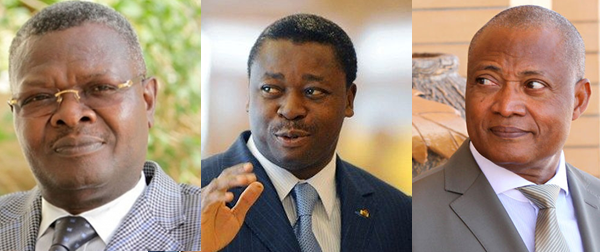Togo goes to polls, as Faure Gnassingbe seeks fourth term
Togolese goes to the polls on Saturday with the incumbent President, Faure Gnassingbe, looking set to claim a fourth term and extend his family’s grip on the presidency of the West African country.
It’s a make or break for opposition parties that in 2017 and 2018 mounted persistent pressure on the administration for constitutional reforms that limit the terms of the President.
The Togolese President faces six contenders, who are also seeking the votes of 3.6 million registered voters.
But it’s a three-man race.

Among prominent contenders is a veteran candidate, Jean-Pierre Fabre, who came second at the last two elections. But expectations among opposition supporters that the 63-year-old would unite a hugely divided opposition front has not materialised.

Another dark horse in the race of unequal is Agbeyome Kodjo, who served as prime minister under Eyadema Gnassingbe. Mr Kodjo’s chance received a shot in arms with the backing of an influential Catholic archbishop—Archbishop Philippe Kpodzro, a retired head of the Lomé archdiocese. The Archbishop received verbally lashes from the government and urged him to “stop meddling in politics.”
A highly religious society, Togolese reveres the Catholic Church.
One name not on the ballot is Tikpi Atchadam, who shot to prominence in 2017 as the head of anti-government protests.
He fled to Ghana in the face of a crackdown by the authorities on his supporters and has seen his influence dwindle.
Turnout could be a deciding factor in the election in which opposition supporters are reportedly not keen on taking part, but the President’s supporters have been chanting a first-round “knock-out blow.”
After surviving protests in 2017 and 2018, Gnassingbe pushed through constitutional changes last year, enabling him to run again — and possibly stay in power for another 10 years.
It has been the continuation of a dynasty rule after Faure’s took over when his father shed the mortal coil in 2005.

“The opposition was able to build a popular movement to worry the regime, but then was not able to capitalise on it. It shot itself in the foot,” opposition politician, Nathaniel Olympio, who is not running in the election, told AFP.
Gnassingbe family has ruled the country since 1967 when Gnassingbe Eyadema took control, overthrowing the country’s first President Sylvanus Olympio.
That coup was the first in Africa and opened the door for scores of others, particularly in West Africa. It paved the way for a violent dictatorship that lasted decades.
Gnassingbe Eyadema ran Togo with an iron fist for 38 years before the military men around him installed his son to take over.
Faure improved the regime’s image, but it still maintains a stranglehold over the country and its financial resources.
The authorities have banned a major civil society group and the Catholic Church from monitoring Saturday’s elections and critics insist it will not be free and fair.
The list includes the West Africa Election Observers Network (WAEON), which accreditation the National Independent Election Commission (CENI) revoked on the eve of the elections.
“This revocation of accreditation, coming few days to the polling day, appears to be with no clear justification. The CNSC-Togo is a credible member of WAEON and subscribes to the Global Principles for Non-Partisan Election Observation and Monitoring by Citizen Organizations and the Code of Conduct for Non-Partisan Citizen Election Observers and Monitors.
“CNSC-Togo had followed all the requirements set by CENI, recruited, professionally trained and received accreditation from CENI, and was preparing to deploy 600 observers for the elections.
“While condemning the actions of CENI, WAEON urges the people of Togo to exercise their franchise during the presidential elections. WAEON urges all stakeholders to ensure a congenial atmosphere for transparent, peaceful, and credible elections,” the WAEON said in a statement copied to theghanareport.com
It reminded the Togolese authorities, particularly CENI, that citizens’ observed groups contributed to the promotion of electoral transparency and credibility.”
“Moreover, the actions it has taken, [does] not only undermine electoral transparency and credibility, but it is also a blow to the quest for democratic advancement in Togo, especially coming after recent political challenges,” it said.



